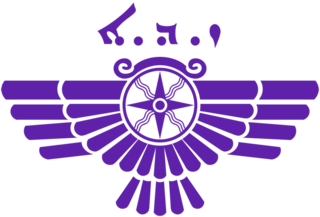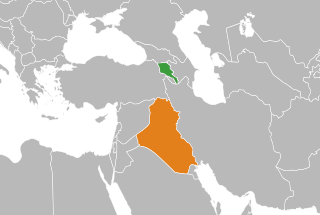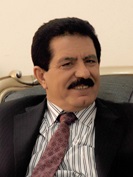Related Research Articles

Mohammad Tofiq Rahim is an Iraqi Kurdish politician. Born in Sulaimaniyah city in 1953,Rahim is currently the secretary of the internal departments of Iraqi Kurdistan's largest opposition grouping Movement for Change.

Barham Salih is an Iraqi Kurdish politician who served as the eighth president of Iraq from 2018 to 2022.

The Assyrian Democratic Movement,popularly known as Zowaa,is an Assyrian political party situated in Iraq,and one of the main Assyrian parties within the Iraqi parliament. The Assyrian Democratic Movement states its aims are to establish equal citizenship rights with the rest of the Iraqi people without discrimination on the basis of nationality,belief,religious affiliation,culture,language and other characteristics of the native Assyrians of Iraq,to acknowledge the past massacres committed against them and to ensure they are never repeated again.

The Iraqi Turkmen Front is a political movement representing the Iraqi Turkmen people. It was founded on April 5,1995 as a coalition of several Turkmen parties operating within the framework of Iraq's unity. The party aims for the Turkmen community to have greater political involvement,increased recognition and more rights.

Kurdistan Region (KRI) is a semi-autonomous federal region of the Republic of Iraq. It comprises four Kurdish-majority governorates of Arab-majority Iraq:Erbil Governorate,Sulaymaniyah Governorate,Duhok Governorate,and Halabja Governorate. It is located in northern Iraq,which shares borders with Iran to the east,Turkey to the north,and Syria to the west.

Iraqi Armenians are Iraqi citizens and residents of Armenian ethnicity. Many Armenians settled in Iraq after fleeing the 1915 Armenian genocide. It is estimated that there are 10,000–20,000 Armenians living in Iraq,with communities in Baghdad,Mosul,Basra,Kirkuk,Baqubah,Dohuk,Zakho and Avzrog.

Masoud Barzani is a Kurdish politician who has been leader of the Kurdistan Democratic Party (KDP) since 1979,and was President of the Kurdistan Region of Iraq from 2005 to 2017.

The Kurdistan Regional Parliament,also known as Kurdistan Parliament - Iraq,or simply Perleman,is the parliament of the Kurdistan Region in Iraq. It is made up of representatives from the various parties,lists or slates that are elected every four years by the inhabitants of Kurdistan Region,which is currently governed by the Kurdistan Regional Government. In 2009 an amendment was applied to the Kurdistan Election Law of the year 1992,changing the name of the body to Kurdish Parliament from its previous name:the Kurdish National Assembly.

Masrour Barzani is an Iraqi Kurdish politician and serving as prime minister of the Kurdistan Region,since June 2019. He is also the chancellor of the Kurdistan Region Security Council and a member of the Kurdistan Democratic Party. He was sworn in as prime minister of the KRG’s ninth cabinet on 10 June 2019,after receiving 87 votes out of 97 legislators in the Kurdistan parliament.

The Kurdistan Region parliamentary elections of 2009 took place on 25 July 2009. A total of 2.5 million citizens of Kurdistan Region were eligible to vote for the parliamentary and presidential elections. People currently living outside Kurdistan Region were not allowed to vote. The elections followed the 2005 Kurdistan Region parliamentary election. The parliamentary elections coincided with the direct election of the President of Kurdistan. Unlike the parliamentary elections in 2005,the president of Kurdistan was to be chosen directly through popular votes. A referendum to approve the constitution of Kurdistan Region originally planned for the same day was put back to 1 August.

Kosrat Rasul Ali is a Kurdish politician and the leader of the Supreme Political Council of the Patriotic Union of Kurdistan (PUK),veteran Peshmerga military leader,former Prime Minister,and former Vice President of the Kurdistan Region.

Ali Bapir,also known as Mamosta Ali Bapir,is a Kurdish Islamic scholar and politician in Iraqi Kurdistan. He is the founder and current president of the Kurdistan Justice Group. He was born in 1961 in the Pshdar district,Iraqi Kurdistan. He has written over 150 books on politics,Islam,society,Kurds,and Kurdistan. He is the most popular politician with the Kurdish Islamism ideology.

The Kurdistan Democratic Party,usually abbreviated as KDP or PDK,is the ruling party in Iraqi Kurdistan and the senior partner in the Kurdistan Regional Government. It was founded in 1946 in Mahabad in Iranian Kurdistan. The party states that it combines "democratic values and social justice to form a system whereby everyone in Kurdistan can live on an equal basis with great emphasis given to rights of individuals and freedom of expression."

The Battle ofSulaymaniyah was one of the greatest battles fought during the 1991 uprisings in Iraq. Sulaymaniyah,a mostly Kurdish city with a population of over 100,000,was the first to be liberated by the rebels and the last to fall back to the Iraqi army.

Ali Askari (1936–1978) was a Kurdish politician,military leader,and revolutionary. He was a prominent leader in Iraqi Kurdistan and his political party was the Patriotic Union of Kurdistan (PUK).

The Iraqi–Kurdish conflict consists of a series of wars,rebellions and disputes between the Kurds and the central authority of Iraq starting in the 20th century shortly after the defeat of the Ottoman Empire in World War I. Some put the marking point of the conflict beginning to the attempt by Mahmud Barzanji to establish an independent Kingdom of Kurdistan,while others relate to the conflict as only the post-1961 insurrection by the Barzanis.

Najmiddin Karim,also known as Najmadin Karim,was an Iraqi Kurdish politician who was governor of Kirkuk Governorate from 2011 to 2017. Prior to the invasion of Iraq,Karim had served in numerous Kurdish and Iraqi opposition groups.
The Kurdistan Democratic Solution Party or PÇDK,was an illegal political party active in Iraq's Kurdistan Region,founded in 2002 and disbanded in 2015. It is part of the Kurdistan Communities Union (KCK),along with the larger Kurdistan Workers' Party (PKK).
The Peshmerga have historically been Kurdish guerrilla forces combating the ruling powers in the region of what is now Iraqi Kurdistan. The term "Peshmerga" refers to those who face death,and the forces have long been an essential element in the Kurdish fight for autonomy and recognition.

Sirwan Saber Barzani is an Iraqi Kurdish businessman,military commander and convicted fraud. He is a member of the Kurdish Barzani family. He is the older brother of Saywan Barzani,a Kurdish diplomat.
References
- ↑ "Armenian rock in Kurdistan mountains". Ararat News & Publishing. 2011-04-11. Archived from the original on 4 September 2011. Retrieved 5 December 2012.
- 1 2 3 4 "Armenian elected to Kurdistan parliament". PanArmenian Network. 31 July 2009.
- ↑ "Election in Kurdistan 2009". Kurdistan4All. Retrieved 8 October 2015.
- ↑ "Armenians in Iraqi Kurdistan – Taking up arms against the ongoing IS threat". Ekurd Daily. Kurd Net. 18 October 2014.